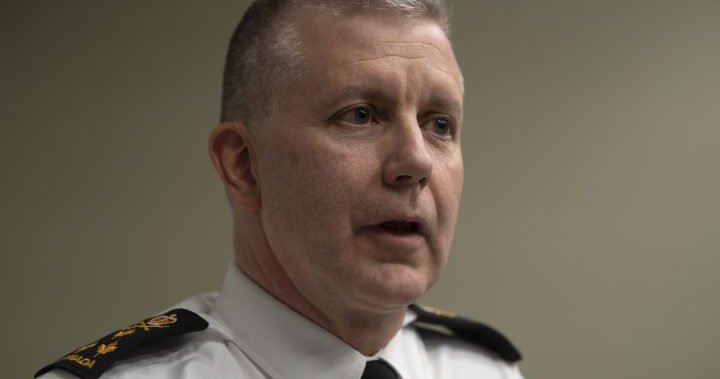Military police investigating Adm. Art McDonald, the current chief of the defence staff, for alleged sexual misconduct have decided not to lay charges against him.
It’s a decision the woman at the heart of the high-profile allegation says leaves her feeling like she’s been “punched in the stomach.”
Global News has learned the Canadian Forces National Investigation Service interviewed dozens of people as part of the probe into the allegation but were unable to determine an agreed upon set of facts as many of those interviewed claimed to have been drunk at the time of the alleged sexual assault.
In a statement issued Friday evening, the Department of National Defence said that its investigation “did not reveal evidence to support the laying of charges under either the Code of Service Discipline or the Criminal Code of Canada.”
“The CFNIS conducts its investigations in a thorough and professional manner independent of the Chain of Command. In this particular case, CFNIS was able to both identify and interview a large number of potential witnesses. The evidence gathered from these witnesses was considered in the ultimate determination that the evidence did not support the laying of any charges.”
Officials said no further information will be released.
McDonald has previously declined to comment when contacted by Global News, citing the ongoing investigation at the time as well as legal advice.
IN HER WORDS: The woman behind McDonald allegation tells her story
“I am not surprised as this was exactly why I was reluctant to come forward and why most survivors don’t come forward. It’s not worth it. I feel a little like I’ve gone through hell for nothing,” said navy Lt. Heather Macdonald, a navy combat systems engineer who has served for 16 years.
“Feel a bit like I’ve been punched in the stomach.”
It is not clear at this time whether McDonald will return to his position as chief of the defence staff.
Witnesses who have testified during twin parliamentary committee probes of sexual misconduct in the military this spring warned repeatedly that women and men who come forward with allegations of sexual misconduct in the Canadian Forces frequently face retaliation from superiors and peers.
Read more:
Senior naval officer was threatened after reporting McDonald allegation: sources
Global News previously reported that the senior naval officer who reported MacDonald’s allegation received anonymous threatening phone calls after doing so from individuals who identified themselves as a “senior member of the Canadian government” and a “senior Canadian Forces officer.”
Defence Minister Harjit Sajjan announced McDonald was stepping aside from his role on Feb. 24, citing a military police investigation into what were at the time unspecified allegations.
Following that announcement, a spokesperson for Sajjan said on Feb. 26 that the minister had not been aware of any allegations about McDonald prior to naming him as chief of the defence staff, and only became aware of an allegation “a number of weeks” after the change of command on Jan. 14.

Macdonald is among the woman who decided to share their experiences publicly earlier this year in the midst of a reckoning over sexual misconduct among senior leaders of the Canadian Forces.
Multiple senior leaders including McDonald’s predecessor, now-retired Gen. Jonathan Vance, stand accused of sexual misconduct and inappropriate behaviour in what experts have described as an institutional “crisis” for the military.
Vance denies all allegations of inappropriate behaviour first reported by Global News on Feb. 2.
READ MORE: The Canadian military has received more than 700 sexual assault reports since 2016: data
In the months since, the military sexual misconduct crisis has sparked twin parliamentary committee probes that heard blistering testimony about both the government’s handling of sexual misconduct allegations as well as the systemic problems in the military that have allowed it to continue.
Key among those problems is the military’s chain of command structure and the lack of an independent reporting system for sexual misconduct complaints, which former Supreme Court justice Marie Deschamps said in her landmark 2015 report resulted in allegations being swept under the rug.
She pointed specifically to a culture that she said is “toxic” to women and LGBTQ members, and urged the creation of an independent reporting system — something that has not yet happened.
In June, a report probing the military justice system determined that sexual misconduct remains as “rampant” and “destructive” in the Canadian Forces in 2021 as it was in 2015.
While both Sajjan and Prime Minister Justin Trudeau have said they want to see an independent reporting system, they have offered no timeline or specifics on how they plan to do so. Instead, they appointed another former Supreme Court justice — Louise Arbour — in April to lead an external review tasked with providing recommendations on the matter.
That review is not set to conclude until next spring.
© 2021 Global News, a division of Corus Entertainment Inc.
















































